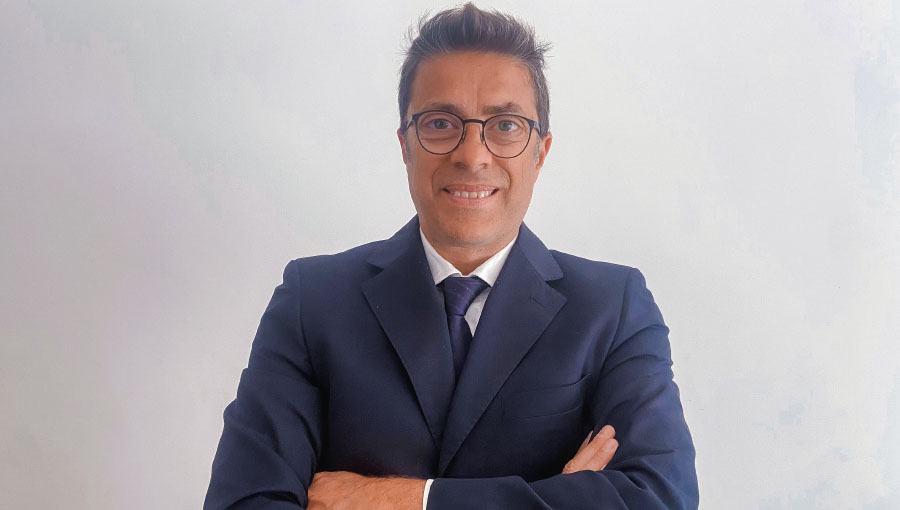Classics as the Heart of Everything: Professor Thomas Govero
Classics Professor Thomas Govero has taught at the high school and college level for over twenty years. He has degrees from St. Louis University and the University of Colorado-Boulder. In addition, he was a Fulbright scholar at the American Academy in Rome. He has taught classics at John Cabot University since 2003 and prior to that at the University of Maryland European Division and Boston University in Padua, Italy. He worked as Regional Director for the School for International Training in Paris for ten years, training program directors and establishing new study-abroad programs throughout Europe and North Africa.
What brought you to Italy and John Cabot?
I first came to Italy on a Fulbright fellowship many years ago to study Roman archaeology at the American Academy. I returned as a study-abroad director (School for International Training-SIT) throughout the late 1970s and then became the European-North African regional director, which brought me to Italy on a regular basis as SIT had a program in Siena. I returned to Italy in 1980 to work for NATO as a special events and travel director. After that I again began to run a study-abroad program first in Venice and then in Rome. Once I substituted for a friend who was teaching at JCU in classics. The rest is history.
With so many liberal arts colleges in the US, why should one choose JCU?
Unlike liberal arts colleges in the USA (and elsewhere) JCU offers a great diversity in an Italian setting, which is itself a very valuable, educational asset and one of JCU’s most important. Since its founding, the institution has remained faithful and dedicated to the liberal arts vision, tradition, and curriculum.
Come on we are in the year 2017, already. Why should one still study the classics?
a. to escape the banalities of the modern, educational curriculum
b. to be inspired (Darwin, who had a “classical education,” was inspired, he recognized that Lucretius delineated evolution)
c. it has always been at the heart of the liberal arts curriculum.
“Liberal” can have a double connotation. It means free from the imposition of extraneous power on the individual, and especially violence, and free to act, to think independently, to be personally fulfilled. Liberal arts education has been at the root of both these meanings, but primarily as a development of the second, which is learning and acting imaginatively. The study of classics was the only educational curriculum right up to the last century and as such, many who studied it altered Western thought with their original and progressive ideas. Petrarch, Marsilio Ficino, Lorenzo Valla, Montaigne (and where would Shakespeare have been without Julius Caesar, Coriolanus, Plautus etc.?), right down to J. K. Rowling.
If we wish to delve into less lofty reasons to study the classics, we could add that it is the only major that has a 100% admission to medical schools in the USA, and mention the cities and towns (such as Cincinnati) named after Roman heroes. Finally, the most important legal system in the world is Roman Law and somebody has got to read Latin to master it. Languages that have descended from Latin are spoken by a large segment of the world’s population and 60% of the modern English vocabulary comes from Latin.
Greek antiquity VS Roman antiquity. Which one do you personally prefer and why?
The Greeks are far more inspiring to the imagination – philosophy, rhetoric, poetry, but I actually admire the Romans more: they developed the content and practice of citizenship (closely related to equality) to a very high degree. They were inclusive whereas the Greeks were snobbishly (and myopically) exclusive – to be a Roman was to be a Roman citizen and without racial, ethnic, religious, or linguistic conditions. They succeeded in this ideal, which is rare; even the USA is on the route to tribal exclusivity. The Romans were the first highly developed, post-tribal society and, by the way, that’s another feature of liberal education transmitted via the study of the classics.
A classic (prose, poem, drama, comedy) that everyone should read and why.
Lucretius, De Rerum Natura. It certainly was a troubling, shocking, eye-opener for me when I was a closed-minded, presumptuous teenager and I can’t imagine it has lost its effect today. It reads as an apology, didactic in form, of utter materialism. There is no divine element in the universe, there is a soul but it perishes with the body and there is no life after death. Finally, there is no creation; matter is eternal and does not increase or decrease. Lucretius makes a strong case for rationalism , as opposed to the Platonic, idealist tradition of western thought, which is still present today. Not unlike other Roman writers, he believes that love is a deficiency bringing on nothing but anxiety, doubt, misunderstandings, and illusions, again in contrast to the more common view of its desirability, satisfaction and sense of fulfillment. He makes positive hints in favor of vegetarianism, respect for animals and their powers of rationality. He also promotes evolution (Darwin will credit him), but is chary of man’s progress.
Greek tragedies are (if closely read) a must too. Again, very troubling and provocative. What can be learned in studying liberal arts if the thinking only confirms convictions?
Teaching methods and approaches to the classics differ greatly in the U.S. and Italy. Which approach do you think is more effective?
I vote for the USA with reservations. The educational tradition tried to inform and inspire students with the values of “democracy” and recognized not institutions, but the individual at the core of that vision. I find education in Italy is often acquiring information and you are “learned” if you can spout out a vast amount of notions. To live and participate in a democracy, the individual not only has to know but interpret and act on those interpretations judiciously. Unfortunately, this ideal has caved-in in American education and has given way to a skill building trend (fine, but) and the fanciful approach of “education for thinking” when the student has to have content before there is thought. Some combination of both systems would be welcome. Many private and local interests are now setting-up charter and even “Latin schools” to revive educational values.






